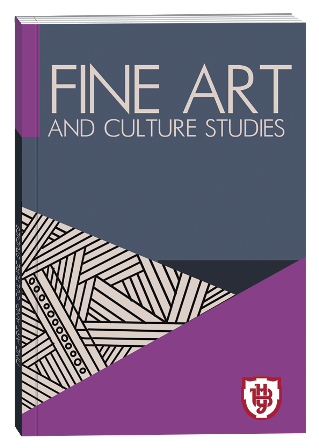DEFINITIONS OF CULTURAL SPACE IN THE SYSTEM OF CULTURAL KNOWLEDGE
DOI:
https://doi.org/10.32782/facs-2023-4-22Keywords:
cultural space, definition, methodological traditions, cultural approaches, theoretical conceptsAbstract
The purpose of the article is to reveal the essence of the concept of "cultural space" based on the analysis of the concepts of "culture" and "space", the analysis of its interpretation in domestic and foreign scientific literature, as well as clarification of methodological approaches to its research. The research methodology combines the method of interpretation and operationalization of concepts (to reveal the content essence of the concept of "cultural space"), the method of terminological analysis, the method of theoretical analysis of scientific literature on the research topic, etc. The outline of the most common definitions of the concept of "cultural space" in cultural works and the analysis of methodological approaches to its research determine the scientific novelty. Conclusions. In modern cultural literature, there is no single generally accepted definition of the concept of "cultural space", and the most common are positions as: a historically, territorially and demographically conditioned complex cultural, social, psychological, philosophical combination of values, ideas, objects, things, traditions, attitudes, ethical , aesthetic norms, socio-political views in a certain cultural situation, manifested at a specific time within a specific area; the space of human creative activity, which provides a dialogue of different cultures based on symbolic speech communication and gives birth to new values and meanings, forms a multiplicity of cultural texts and acts as a unity of cultures of one or another area; integrated model, a set of complementary cultural practices and mechanisms of their functioning; system integrity of several levels: environment, society, communication and intelligence; conditional area in which the creative activity of a person is formed and realized. The characteristic properties of the cultural space are: the presence of a clear structure, dynamics, heterogeneity, universality, fundamentality, virtuality, etc. The study revealed that in the modern scientific dimension there are several theoretical concepts of cultural space: anthropological, abstract and literary and artistic (according to O. Hrytsenko); the main methodological approaches to its research are: functional, actionist, anthropological, dialectical, noospheric, cybernetic, relational, synergistic, informational.
References
Гриценко О. Культурний простір і національна культура: теоретичне осмислення та практичне формування: монографія. Київ: Інститут культурології НАМ України, 2019. 256 c.
Давиденко А. О. Культурний простір як основа формування концептів. Закарпатські філологічні студії.2019. Т. 2. Вип. 9. С. 84–87.
Злобіна Т. Роль культурного простору у процесі становлення української політичної нації: дис. …канд. філос. наук. Київ: НІСД, 2009. 218 с.
Марченко В. В., Віткалов С. В. Регіональний культурний простір України як фактор активізації мистецької ініціативи. Вісник Маріупольського державного університету. Серія : Філософія, культурологія, соціологія. 2014. Вип. 8. С. 44–49.
Олійник О. М. Культурний простір, комунікація, місто: співвідношення понять. Культура і мистецтво у сучасному світі. 2019. Вип. 20. С. 169–177.
Піскун В. Формування культурного простору сучасної України: взаємодія українського і запозиченого. Українознавчий альманах. Вип. 5. Київ: КНУ ім. Т. Г. Шевченка, 2011. С. 106–108.
Степанова О. Національний культурний просторі України: концептуальні засади розвитку і становлення : автореф. дис. ... доктора культурології : 26.00.01. Київ, 2017. 32 с.
Фесенко Г. Г. Роль музеїв у формуванні культурного простору України. Пространство литературы, искусства и образования – путь к миру, согласию и сотрудничеству между славянскими народами : сб. науч. трудов : по материалам VI междунар. науч.-практ. конф., Харьков, 16 декабря 2011 г. / [под ред. А. Г. Романовского, Ю. И. Панфилова]. Харьков : НТУ «ХПІ», 2012. С. 184–189.
Філіна А. Культурний простір: основні його види та культурна діяльність суспільства щодо задоволення соціокультурних потреб громадян. Міжнародний вісник: Культурологія. Філологія. Музикознавство. 2016. Вип. 1. С. 82–86.
Шершньова О. В. Формування нової моделі культурного простору (на прикладі громад Рівненщини): монографія. Острог : ФОП-видавець Свинарчук Р. В., 2019. 344 с.
Braudel, Fernand (1979). Civilization and Capitalism, 15th–18th Century, translated by Siân Reynolds, 3 vols.
Cassirer, Ernst (1985). Symbol, Technik, Sprache: Aufsatze aus d. Jahren 1927-1933. Hamburg: Mainer Verlag. рр. 93–119.
Heidegger, Martin (1969). Zeit und Sein. In: Zur Sache des Denkens. Tübingen, Niemeyer. рр. 5-31.
Kupiainen, Jari, Sevänen, Erkki, Stotesbury, John (2004). Cultural Identity in Transition. Atlantic Publishers and Distributors, New Delhi, India.
Moles, Abraham A. (1967). Sociodynamique de la culture. 343 р.
Rapoport, Amos (1977). Human Aspects of Urban Form-Towards a Man Environment Approach to Urban Form andDesign. Oxford: Pergamon Press. 458 р.
Segers, Rien. T. (2002). The Underestimated Strength of Cultural Identity Between Localising and Globalising Tendenciesin European Union. SPIEL: Siegener Periodicum zur Internationalen Empirischen Literaturwissenschaft. Jg. 21. Heft 2. рр. 159-177.
Thapar, Romila (2004). Cultural Transaction and Early India: ‘Tradition and Patronage’. Comprising History andBeyond, Oxford University Press. 46 р.
Williams, Raymond (1983). Keywords, London: Fontana. 339 р.
Young, Robert M. (1994). Mental Space. Process Press. 200 р.







